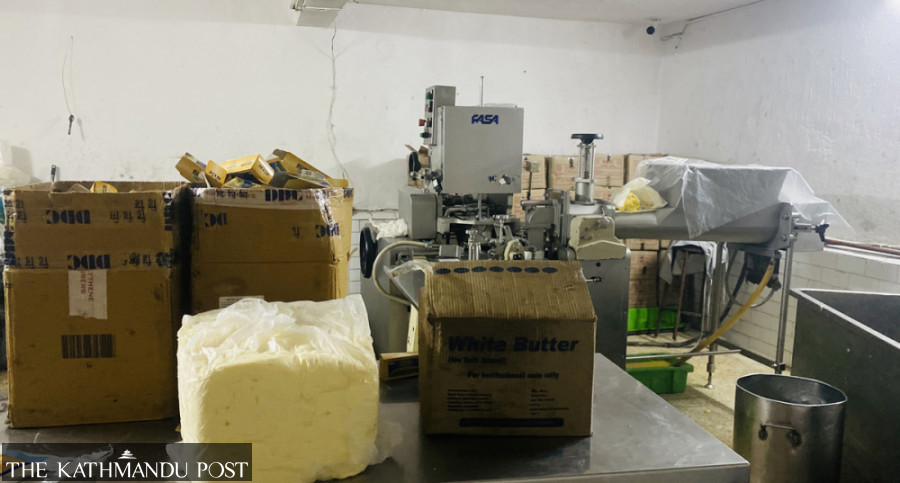Money
Quality watchdog catches 100 firms for adulteration
Among those hauled to court are drinking water plants, bakeries and biscuit manufacturers, and oil and ghee producers, a report said.
Krishana Prasain
The government quality watchdog pounced on various firms for selling poor quality and adulterated food in the last fiscal year, even as most of the population remained indoors due to the pandemic.
The Department of Food Technology and Quality Control said it had filed cases against 100 companies at different district administration offices and courts in the fiscal year 2020-21 ended July 15 for mixing illegal ingredients in food products and selling items unfit for human consumption.
State-owned Dairy Development Corporation was among those dragged to court. Its butter was found to be adulterated and the processed milk was bad.
Consumer rights activists say that as long as consumers consider food adulteration a minor problem and the government plays down its impact on the health system, the offence keeps growing.
The department and its regional offices collected 2,834 samples in the last fiscal year, among them 219 were found to be adulterated or not fit for consumption.
Ganapati Vanaspati, Bara faced action for producing or selling low quality soybean and sunflower oil. Kaski-based Pokhara Noodles was caught for producing or selling low quality readymade noodles, and Pashupati Khadya Tel Udhyog of Sunsari was found producing or selling processed soybean oil without labelling.
Action was taken against Kwality Diet & Food Products of Sunsari for producing or selling low quality biscuit, Rijal Tashi Industries of Sunsari for selling ginger pickle without labelling, Kwality Food and Snacks Industries for using low quality ghee to manufacture food products and Asian Thai Food of Sunsari for producing low quality noodles.
Hearings are in progress at the respective district administrative offices and courts, said Upendra Ray, director general of the Department of Food Technology and Quality Control.
But according to Ray, consumer cases never get priority as the District Administrative Offices and courts pay more attention to other cases. “As a result, it takes a long time to issue verdicts in such cases.”
A report said 16 percent of the cases involved drinking water plants, 13 percent bakery and biscuit manufacturers, 11 percent edible oil and ghee producers, 9 percent animal feed manufacturers, 7 percent noodle manufacturers, 7 percent spice producers, 5 percent mixed snacks manufacturers and 4 percent sauce and lentil companies.
The others were companies producing sweets, milk, curd, dried fruits, rice and other food items.
According to the report, 40 percent of the cases involved substandard foods, 26 percent adulteration, 26 percent lack of labelling and 8 percent violation of the Food Act Regulation Directives.
The department said many factories committing serious offences have been sealed under the Food Act 1967 and the Food Regulation 1970.
Last October, just before the Dashain festival, the police and the Department of Commerce, Supplies and Consumer Protection raided the warehouse of Ayan Distributors and seized tonnes of expired foods and other items that were being relabelled with new dates and readied to be shipped to market.
The expired products had accumulated as retailers and distributors were unable to sell them within the recommended dates due to the Covid-19 lockdown last year.
As the supply chain remained disrupted during the prohibitory period in Kathmandu Valley and different parts in the country, the Department of Commerce, Supplies and Consumer Protection issued a notice recently warning consumers to watch out for expired food products and check the labelling on the packages.
The Department of Commerce, Supplies and Consumer Protection discovered expired food and non-food items worth Rs30.98 million on store shelves during market inspections in the last fiscal year.
The food items included chocolates, biscuits, soft beverages and beers, among others while non-food items included paints and cosmetic goods.
Selling expired goods by affixing new labels on such goods which are not consumable or are not supposed to be used is a violation of the Consumer Act 2018.
Cases related to unfair trade practices are filed at the District Court or the District Administration Offices, which involves lengthy administrative procedures and bureaucratic hassles. It usually takes three to six months for the District Court to give a verdict, while in many cases the guilty firm does not face any real action as the evidence is lost over the period, according to consumer rights activists.
Three years have passed since the amended Consumer Protection Act 2018, which contains a provision requiring the government to establish a consumer court, was endorsed. But there are no indications of a consumer court being set up, and this shows how serious the government is about ensuring the rights of consumers, activists said.
Last July, the government registered a bill to amend and integrate laws related to food purity and quality in Parliament. The proposed legislation envisages stern penalties against producers and sellers of substandard and adulterated food.
“It has been three years since we prepared the draft bill, but it has got nowhere due to the endless political turmoil,” Ray said. The penalty proposed in the new law is significantly higher than those prescribed by the prevailing Food Act which sets a maximum penalty of six months in jail and Rs5,000 in fines.
Prem Lal Maharjan, president of the National Consumer Forum, said that the government seems careless on reports like this as it works under pressure and influence of political parties or business people.
“Unless the government becomes sensitive to reports like this which have a direct impact on human health, the unfair practice of producing and selling contaminated food will keep on continuing,” he said.




 9.6°C Kathmandu
9.6°C Kathmandu















